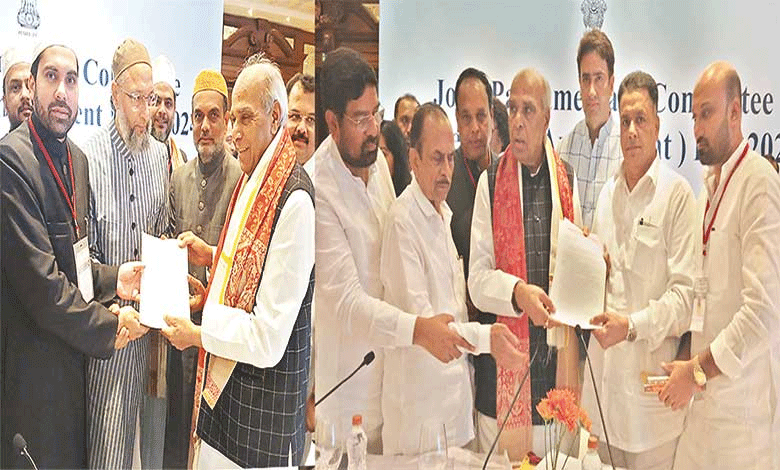Hyderabad Meeting on Waqf Amendment Bill Becomes Chaotic
The meeting of the Joint Committee of Parliament regarding the Waqf Amendment Bill held in Hyderabad was marked by heated discussions and chaos, with protests erupting outside the meeting venue. Supporters of the BJP raised slogans over the delay in being invited to the meeting, chanting "Bharat Mata Ki Jai."

Hyderabad: The meeting of the Joint Committee of Parliament regarding the Waqf Amendment Bill held in Hyderabad was marked by heated discussions and chaos, with protests erupting outside the meeting venue. Supporters of the BJP raised slogans over the delay in being invited to the meeting, chanting “Bharat Mata Ki Jai.”
Inside the Taj Krishna Hotel, where the meeting was held, tensions flared as supporters and opponents of the bill engaged in heated exchanges. The meeting was chaired by Jagdambika Pal, along with prominent attendees such as Hyderabad MP Asaduddin Owaisi and other committee members.
In his address, Committee Chairman Jagdambika Pal mentioned that discussions had taken place with a representative delegation from the Waqf Boards of Chhattisgarh and Andhra Pradesh. The meeting saw participation from representatives of 42 organizations from various cities. The Hyderabad meeting stood out for several reasons.
During the Saturday meeting, residents of Telangana and Andhra Pradesh were given the opportunity to present their views on the bill. A representative delegation from the Telangana government, led by Advisor Mohammad Ali Shabbir, welcomed the committee members and discussed the bill. The Chairman of the Telangana Waqf Board, Muhammad Azmatullah Hussaini, also met with committee members.
The meeting not only featured representation against the bill from the Telangana government but also arguments from the Andhra Pradesh Waqf Board, which is led by the Telugu Desam Party, a member of the NDA. The opposition from the Andhra Pradesh Waqf Board surprised committee members.
Representatives from the All India Sufi Sajada Nasheen Council, initially supportive of the bill under the assumption that the government would establish a separate ‘Dargah Board’ for the welfare of shrines and their caretakers, later decided to oppose the bill. A significant number of current heads of major shrines and Sufi orders chose to represent their opposition to the bill before the Joint Committee, submitting a written memorandum.
While representatives of the BJP and allied organizations supported the bill, the All India Muslim Front from Telangana also made their representation. Shafiq-ul-Zaman, former Special Chief Secretary, presented the position of the Andhra Pradesh Waqf Board before the committee. Representatives from the Bharat Rashtra Samithi, including former Home Minister Mahmood Ali, former Waqf Board Chairman Muhammad Saleem, and former Waqf Board Chairman Masihullah Khan, expressed their party’s stance against the bill.
Following the Hyderabad meeting, the committee plans to hold sessions in Bengaluru and Chennai. The Modi government had introduced the Waqf Amendment Bill in the Lok Sabha on August 8. However, after intense discussions, a Joint Committee of both Houses of Parliament was formed to review the bill and present a report. The committee is expected to submit its report before the end of the first week of the upcoming Parliament session.
Leaders of the Sufi Sajada Nasheen, including Hazrat Abdul Ghani Muhammad Atif Miya from Khanqah Qadriya Badaun, UP; Hazrat Afzal Muhammad Farooqi Safavi from Khanqah Safavia Unnao, UP; Hazrat Syed Ghulam Afzal Biabani Rafai Qadri, also known as Khasro Pasha, from Barghah Afzaliya Qazipet and Chairman of the Telangana Hajj Committee; and other notable figures, expressed their views during discussions with select media representatives in Hyderabad. They stated that their association includes heads of khanqahs representing various Sufi orders in India.
They noted that the government has rushed to amend the current Waqf law, asserting that the proposed amendments do not adequately protect waqf properties, the rights of trustees, or the optimal use of waqf assets.
They stated that the amendments to the Waqf law are detrimental, and therefore, they felt it was their responsibility to present their position on the bill’s flaws and shortcomings before the Joint Committee. They emphasized that if the bill were not generally harmful, they would not have come forward from their khanqahs.
